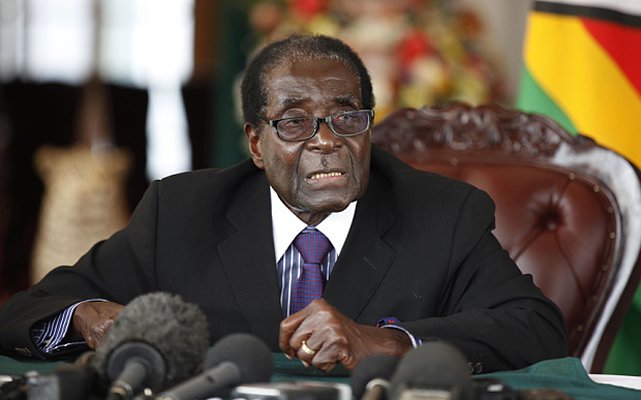President returns home

Caesar Zvayi recently at the UNITED NATIONS, New York
PRESIDENT Mugabe returned home yesterday from the United Nations where he attended the inaugural High-Level Conference on the implementation of Sustainable Development Goal 14.
The SDGs are a set of sustainable development targets adopted by the UN to succeed the Millennium Development Goals that lapsed in 2015, and SDG 14 deals with the conservation and sustainable use of oceans, seas and marine resources. SDG14, thus, dovetails with Zimbabwe’s development thrust as Government seeks the judicious exploitation of natural resources in a sustainable manner in addition to getting a fair deal on marine traffic as a landlocked country that depends on others for access to ports.
The President, who was accompanied by First Lady Amai Grace Mugabe, Foreign Affairs Minister Simbarashe Mumbengegwi; Environment, Water and Climate Minister Oppah Muchinguri-Kashiri and senior Government officials, was welcomed at Harare International Airport by Vice Presidents Emmerson Mnangagwa and Phelekezela Mphoko; Minister of State for Harare Provincial Affairs Miriam Chikukwa; Information, Media and Broadcasting Services Minister Chris Mushohwe; Defence Minister Sidney Sekeramayi; Service Chiefs and senior Government officials.
The Oceans Conference, which was co-chaired by Fiji and Sweden, ended on Friday with the adoption of a declaration dubbed “Our Oceans, Our Future – Call to Action” by 193 member states.
Member states agreed to implement robust, long-term strategies to reduce the use of plastics and micro-plastics such as plastic bags and single use plastics.
They also agreed to implement effective adaptation and mitigation measures to ocean and coastal acidification, sea level rises and increases in ocean temperatures.
Most significantly, the Call to Action upholds the importance of the Paris Agreement on climate change to the implementation of SDG14 despite opposition from the US and Egypt which resisted the inclusion of the phrase climate change in the Call to Action.
Meanwhile, Cabinent ministers have said Zimbabwe has as much a right as coastal states to deliberate on the state and fate of the oceans as marine environments belong to all nations, with coastal countries laying claim to only 200km of territory.
Speaking to journalists at Harare International Airport on arrival from New York, Foreign Affairs Minister Simbarashe Mumbengegwi dismissed claims from some quarters that Zimbabwe should not have attended the Oceans Conference.
‘‘You see, what must be remembered in fact is that the countries which have got shorelines, their territorial waters only go for 200km, the rest belongs to humanity, to all countries. All the oceans belong to all countries of the world. The ones which have got shorelines, their territorial waters only go for 200km. After that we have as much right, as much stake as anyone else on this globe as to what happens on the high seas,” said Minister Mumbengegwi. “They can’t just go there and dump waste, and dump all sorts of toxic materials and so on because we have a stake even though we are landlocked. That is where our rain comes from, that is where half of our oxygen comes from. It affects the whole world, so we have an interest, we have a stake that is why 193 countries were there,’’ he said.
Zimbabwe is party to the United Nations Convention on the Law of the Sea, which it ratified in February 1993.
To date, 165 countries, including 28 landlocked states, have ratified UNCLOS, which defines the rights and responsibilities of nations with respect to their use of the world’s oceans, establishing guidelines for businesses, the environment, and the management of marine resources. This was a very important gathering, this was a very important summit. In fact, all the 193 members of the UN were represented at various levels, just underlining the importance. The question of the conservation of the oceans, seas and water bodies is absolutely fundamental in the survival of our planet,’’ Minister Mumbengegwi added.
He rapped the wanton pollution of marine environment saying the practice of treating seas and oceans as huge septic tanks had to stop as this had deleterious effects on the habitability of the Earth in the long run. ‘‘This whole idea of regarding the sea as one huge septic tank where you can empty all your waste must just stop because in fact it is big, it is huge but if we continue at this rate then a time will come when the sea will die and when it dies, when the oceans die, the planet will die. So this was really the main focus of the summit. It was an international conference, all the members were there,’’ he said.
Environment, Water and Climate minister Muchinguri-Kashiri concurred, saying it was folly to try to separate the land from the oceans as they are interrelated.
‘‘I really think it’s crazy. As I have already alluded to, 70 percent of all the Earth’s land is covered by oceans, and whatever is collected on land ends up in the oceans …’’ she said.
‘‘The seas are very critical to us because of the blue economy that they serve. We get our fish protein from the oceans, also tourism, also trade. For us it’s very critical that we keep the seas clean and away from acidification because we survive from the oceans,’’ she added.
Minister Muchinguri-Kashiri said it was critical to appreciate that it’s very expensive for landlocked countries to trade hence they cannot divorce themselves from deliberations at the Oceans Conference.
The conference, which ran from June 5 to 9, sought to, among other things, reverse the decline in the state of the oceans and seas focusing on solutions-focused engagement by all stakeholders.











Comments